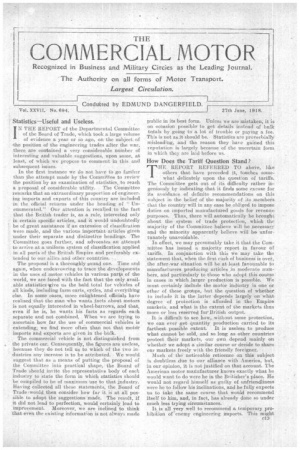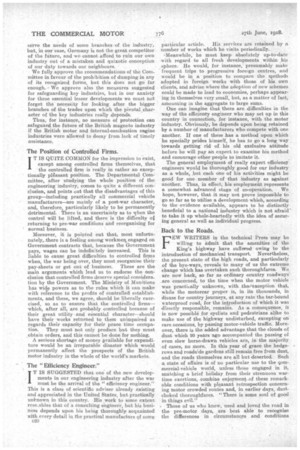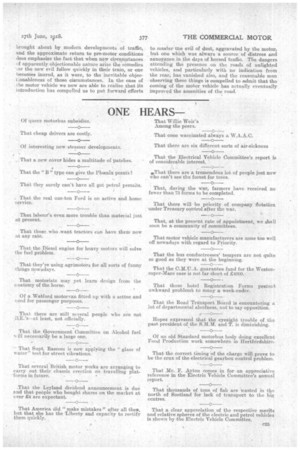Statistics—Useful and Useless.
Page 1

Page 2

Page 3

If you've noticed an error in this article please click here to report it so we can fix it.
N THE REPORT of the Departmental Committee of the Board of Trade, which took a large volume of evidence a year or so ago, on the silbject of 'the position of the engineerin,g trades after the war, there are contained a very considerable nuinber of interesting and valuable, suggestions. upon some, at Jena,' of which we pre/pose to comment in this and subsequent issues.
In the first instance we do not have to go farther than the attempt made by the Committee to review the position by an examination of statistics, to reach " a proposal of considerable utility. The Committee remarks that an eXtraordinary proport ion of engineering imports and exports of this country are included in the official returns under the heading of " Unenumerated." Our attention is recalled,to the fact that the British trader is, as a rule; interested only in certain specific articles,, and it _would Undoubtedly be of great assistance if an extension of classification were made, and the Various imPortaint: articles' given • Under their separate and "distinctive headin"gs. _The Committee goes further, and advocates an attempt • to arrive at a uniform system of classification applied . in all parts of the British Empire and preferably extended to our allies and •other countries.
The proposal is a. thoroughly sound ene. Time and again, when endeavouring to trace the developments in the uses of motor. vehielea in various parts of the world, we are faced with the fact that the only available statistics wive us the bald total for vehicles of all kinds, ineluding farm tarts, cycles, and everYthing else. In some eases, more enlightened officials have realised -that the man who wants facts aboutzmotors is not equally interested in wheel-barrow, and that, even if he is, he wants his facts as regards each separate and not combined. When we are trying to ascertain how far the use of commercial vehicles is extending, we find more often than not that motor imports and exports are given in the•brilk.
The commercial vehicle is not distinguished from the priVate ear. Consequently, the figures are useless, because they do not tell us to which of "the two industries any increase is to be attributed. We would suggest that as a, means of putting the proposal of the Committee into practical shape; the Board of. Trade should invite the representative body of each industry to state the form in which statistics should be compiled to be of maximum Use to that ,industry. Having collected all these statements, the Board of Trade 'would then consider how far it is: at all possible to adopt the suggestions made. The result, if it did not lead to perfection, would certainly lead to improvement. Moreover', we are inclined to think . that even the existing information is net always made public in its best form. Unless we are mistaken, it is on oc'easion possibleto get details instead uf hulk -Weis by going to a lot of trouble or paying a fee. This is not asit should be. Statistics are proverbially misleading, and the reason they have gained this reputation is largely because of the uncertain form. in which they are laid before us.
How Does the Tariff Question Stand?
HE REPORT REFERRED TO aboVe, like . others that have preceded it, touches somewhat delicately upon the question of tariffs. The Committee gets out of its difficulty rather ingeniously by indicating that it finds some excuse for its avoidance of definite recommendations on this subject in the belief of the majority of its members that the country will in any case be obliged to impose duties on imported manufactured goods for revenue .purposes. Thus, there will automatically be brought .about the -system of trade protection, which the majority or the Committee believe will be necessary and the minority apparently believe Will bounfortunately unavoidable.
In effect, we may presumably take it that the Committee has issued a majority report in favour Of tariffs. In conjunction with this we 'may z take the .zstatement that, when the first rush of business: is over, ethe after war situation will be at least favortrable to manufacturers producing articles in moderate numbers, and particularly to those who adoiot thiS"eourse in eases in zwhich larger production is possible. We must certainly include the motor industry in one or other of these group's, but the question of whether to include it in the latter depends' largely on" what degree of protection is afforded in the Empire markets. and what is the extent of the markets thus more or less reserved for' British output.
It. is difficult to see how, without some protection, . we can ever get quantity production carried to its farthest possible extent. It is useless to produce what cannot be sold, and so long as other countries protect their markets, our own depend mainly on whether we adopt a similar course or decide to share our markets freely with the friendly foreigner.
Much of thenoticeable reticence on this subject is doubtless due to our alliance with America, but, in our opinion, it is not justified' on that account. The American motor manufacturer knows exactly what he would want to do were he in the Britisher's place. He would not regard himself as guilty of unfriendliness were he to follow his inclinations, and he fully expects .us to take the same course that Would recommend itself to him, and, in fact, has already done so under much less trying circumstances.
•
it is all very well to recommend a temporary prohibition of enemy engineering imports. This might serve the needs of some branches of the industry, but, in our case, Germany is not the great competitor of the future, and we cannot afford to ruin our own industry out of a mistaken and quixotic conception of our duty towards our neighbours. • We fully approve the recommendations of the Corn_ mittee in favour of the prohibition of dumping in any of its recognised forms, but this does not go far enough. We approve also the measures suggested for safeguarding key industries, but in our anxiety for these essential lesser developments we must not forget the necessity for looking after the bigger branches of the trades upon which the pivotal_character of the key industries really depends.
Thus, for instance, no measure of protection can safeguard the future of the British magneto industry if the British motor and internal-combustion engine industries were allowed to decay from lack of timely assistance.
The Position of Controlled Firms.
IT IS QUITE COMMON for the impression to exist, except among controlled firms themselves, that the controlled firm is really in rather an exceptionally pleasant position. The Departmental Committee, after 'studying the whole position of the engineering industry, comes to quite a different conclusion, and points out that the disadvantages of this group—including practically all commercial vehicle manufacturers—are mainly of a, post-war character, and, therefore, particularly likely to be permanently detrimental. There is an Uncertainty as to vrhen the control will be lifted, and there is the difficulty o; returning to pre-war conditions and reorganising for normal business.
Moreover, it is pointed out that, most unfortunately,.there is a feeling among workmen engaged on Government contracts that, because the Government pays, wages can be indefinitely increased. This is liable to cause great difficulties to controlled firms when, the war being over, they must reorganise their pay-sheets or get out of business. These are the main arguments which lead us to endorse the conclusion that controlled firms deserve special consideration by the Government. The Ministry of Munitions has wide powers as to the rules which it can make with reference to the profits of controlled establishments, and these, we agree, should be liberally exercised, so as to ensure that the controlled firms-which, after all, are probably controlled because of their great utility and essential character—should have their works returned to them unimpaired as regards their capacity for their peace time occupation. They must not only produce but they must .obtain orders, and this cannot be done for nothing.
A serious shortage of money available for expenditure would be an irreparable disaster which would permanently affect the prospects of the British motor industry in the whole of the world's. markets.
The "Efficiency Engineer:"
IT IS SUGGESTED that one of the new developments in our engineering industry after the war must be the arrival of the "efficiency engineer." This is a class of scientific adviser already existing and appreciated in the United States, but practically unknown in this country. His :work to some extent rese.nbles that of a consulting engineer, but his business depends upon his being thoroughly acquainted with every detail in the practical manufacture qf some particular article. His services are retained by a number of works which he visits periodically.
-Meanwhile, he must keep absolutely up-to-date with regard to all fresh developments within his sphere. He would, for instance, presumably make frequent trips to progressive foreign centres, and would be in a position to compare the methods adopted in foreign works with those of his own clients, and advise where the adoption of new schemes could be made to lead to economies, perhaps appearing in themselves very small, but, as a matter of fact, amounting in the aggregate to large sums.
One can imagine that there are difficulties in the way of the efficiency engineer who may set up in this country in connection for instance, with the motor industry. Obviously, he depends upon being retained by a number of manufacturers who compete with one another. If one of these has a method upon which he specially prides himself, he has to go a long way towards getting rid of his old exclusive attitude before he will pay an expert to examine his method and encourage other people to imitate it.
The general employment of really expert efficiency engineers would be thoroughly good for our industry as a whole, but each one of his activities might be good for one. member of that industry as against another. Thus, in effect, his employment represents a somewhat advanced stage of co-operation. We hope, however, that it may not prove impossible to go so far as to utilise a development which, according to the -evidence available, appears to be distinctly beneficial to a national industry which is not afraid" to take it up whole-heartedly with the idea of securing general as well as individual progress.
Back to the Roads.
FEW WRITERS in the technical 'Press may be willing to admit that the amenities of the King's highway have suffered owing to the introduction of mechanical transport. Nevertheless, the present state of the high roads, and particularly of the bye-ways, reveals to many of us the extreme change which has overtaken such thoroughfaresWe are now back, so far as ordinary country roadways . are concerned, to the time when the motor vehicle was practically unknown, with the exception that, while the motorcar proper is, in its thousands, in disuse for country journeys, at any rate the tar-bound waterproof road, for the introduction of which it was directly responsible, remains. As a consequence, it is now possible' for cyclists and pedestrians alike to make use of the highway undisturbed, excepting on rare occasions, by passing motor-vehicle traffic. Moreover, there is the added advantage that the clouds of dust which 20 years -ago accompanied the passing of even slow horse-drawn vehicles are, in the majority of cases, no more. In this year of grace the hedgerows and roadside gardens still remain free from dust, and the roads themselves are all but deserted. Such a state of affairs is of no particular use to the val.rnercial-vehicle world, unless those engaged in it, snitching a brief holiday from their strenuous wartime exertions, combine enjoyment of these remarkable conditions with pleasant retrospection concerning motor crowded routes and, in earlier days, dustchoked thoroughfares. "There is some soul of good in things evil."
Those of us who knew, used and loved the road in the pre-motor days, are best able to recognise the differences in circumstances and conditions brought about by modern developments oftraffic, and the approximate return to pre-motor conditions does emphasize the fact that when new circumstances apparently objectionable nature arise the remedies or the new evil follow quickly in their train, or one b.econies inured, as it were, to the inevitable Objectionableness of those eisemnstances. In the case of the motor vehicle we now are able to realise that its .introduction has compelled us to put ferward efforts to master the evil of dust, aggravated by the motor, ._ but one which was always a source: of distress and annoyance in the days of horsed traffic. The dangers attending the presence on the roads of unlighted vehicles, and particularly with no indication from the rear, has vanished also, and the reasonable man observing these things is compelled to admit that the coming of the motor vehicle has actually eventually improved the amenities of the road.






















